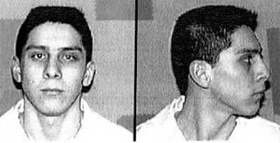 |
 |
 |
 News from Around the Americas | March 2005 News from Around the Americas | March 2005  
US Supreme Court May Not Decide Case of Death-Row Mexican
 James Vicini - Reuters James Vicini - Reuters


| | In a decision on March 31, 2004, the World Court in The Hague said the United States should review the cases of the 51 Mexican death-row inmates, because U.S. officials failed to tell them of their right under the Vienna Convention to promptly consult consular officers after their arrests. Jose Medellin, (above) who is on death row in Texas, was denied the right to meet a consular officer from Mexico after his arrest for murder. |
US Supreme Court justices questioned the need to decide the case of a Mexican on Texas' death row, after US President Bush said the defendant and 50 other inmates should get new hearings because they weren't told of their right to talk to Mexican officials.

During arguments, the justices appeared inclined to avoid a decision on the merits in the case of Jose Medellin, who is on death row in Texas. He was denied the right to meet a consular officer from Mexico after his arrest for murder.

A month ago, Bush decided to comply with a World Court decision and said state courts should review the 51 cases to determine whether the violation of their rights caused them any harm at trial or at sentencing.

Although Bush called for review of the cases, he then withdrew the United States from the part of the treaty that gives the World Court enforcement authority to decide future disputes involving foreign inmates.

Justice Antonin Scalia said the issue of whether Bush had authority to require new hearings and whether the Mexicans should get any relief would be decided in the state-court proceedings. "The whole thing could go away," he said.

Other justices questioned whether the court should simply dismiss Medellin's appeal on technical grounds, or whether they should grant his request to put the case on hold while it goes back to a Texas court.

Medellin, a gang member, was sentenced to death in state court for the 1993 rape and murder of two teenage girls in Houston, Texas. The brutal killings stemmed from a gang initiation.

In a decision on March 31, 2004, the World Court in The Hague said the United States should review the cases of the 51 Mexican death-row inmates, because U.S. officials failed to tell them of their right under the Vienna Convention to promptly consult consular officers after their arrests.

Under the Vienna Convention, which the United States ratified in 1969, U.S. officials must tell foreign nationals of their right to contact their consulates after their arrest and must notify the consulate of the arrest.

A U.S. appeals court agreed with Texas state arguments that it was too late for Medellin to pursue his claim of treaty violation because he did not raise the issue at his trial.

Medellin's attorney, Donald Donovan, urged the justices to hold the case open while the Texas courts consider it.

But Justice Sandra Day O'Connor called that an "unusual request" and said she could not recall the court ever doing that. She said the more likely action would be to dismiss the case on technical grounds.

Texas Solicitor General R. Ted Cruz said Bush's decision involved "significant constitutional problems." Texas has opposed review for any of the Mexicans on its death row.

But he said the constitutional issue could be reviewed by the state courts and ultimately by the Supreme Court, a possibility that Justice Anthony Kennedy also mentioned.

Justice John Paul Stevens said the state court proceedings could make the issue moot and added the court by ruling now "may engage in a lot of useless activity."

Justice Department lawyer Michael Dreeben agreed and said the merits of the dispute may never need to be reached, depending on how the state courts rule. | 
 | |
 |



